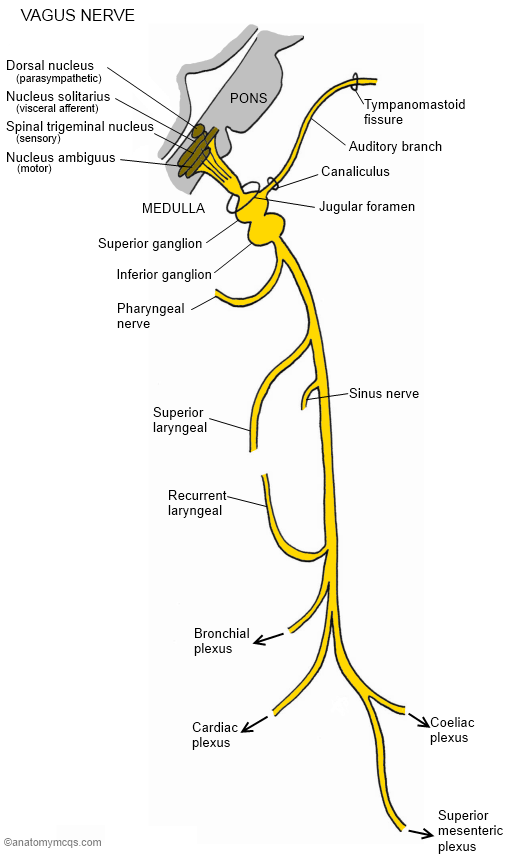Question #538
The vagus nerve
The vagus nerve is the tenth cranial nerve. It arises from the brainstem as a number of small rootlets just caudal to the glossopharyngeal nerve. It receives communicating branches from both the glossopharyngeal nerve and the cranial accessory nerve.
Although the vagus nerve is the longest of all the cranial nerves it has a relatively short intracranial course, passing immediately out through the jugular foramen. The first branch is given off as the nerve passes through the jugular foramen, the auricular nerve (also known as Arnold’s nerve).
On exiting the skull the nerve lies posterior to the internal jugular vein and the internal carotid artery in the carotid sheath. It gives three main branches in the neck:
- The pharyngeal – supplies muscles of the pharynx including the three pharyngeal constrictors, palatopharyngeus, salpingopharyngeus, levator palati and palatoglossus.
- The superior laryngeal – supplies sensation to the larynx above the vocal cords (internal branch) and the cricothyroid muscle (external branch).
- The recurrent laryngeal - supplies sensation to the larynx below the vocal cords and all the intrinsic laryngeal muscles.
The vagus nerve continues inferiorly passing over the subclavian artery on the right and the arch of the aorta on the left. As the nerve passes over the aortic arch small branches are sent to the chemoreceptors and baroreceptors.
From here the vagus nerves pass posteriorly to cross the thorax posterior to the hila of the lungs. On the right the nerve comes to lie even more posterior, becoming the posterior vagal trunk, while the left vagus comes to lie anterior to the stomach and becomes the anterior vagal trunk. Both trunks pass through the diaphragm at the oesophageal hiatus at the level of T10.
Once in the abdomen the vagus nerve innervates all gut derived structures up to 2/3rds along the transverse colon. In addition it innervates the kidneys but it does not innervate the adrenal glands.
